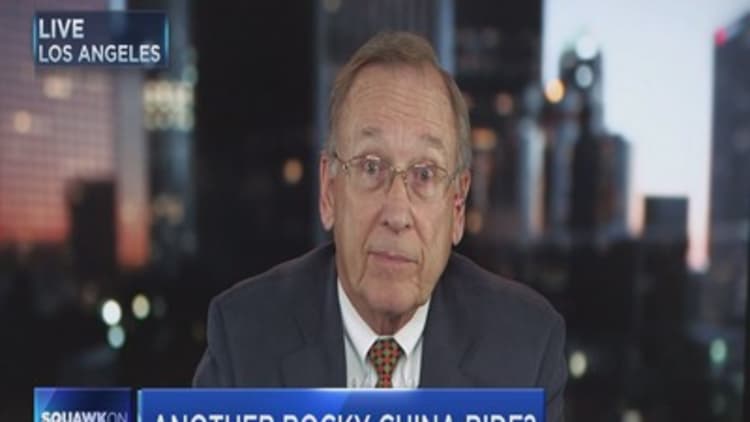Beijing has unveiled a string of measures to soothe sentiment following Monday's stock crash, reviving memories of last year's aggressive stabilization program but fueling doubts over China's commitment to market reforms.
On Tuesday, state-controlled funds, known as China's National Team, were reportedly buying equities while the People's Bank of China (PBOC) injected $20 billion into money markets—the largest operation since September. Authorities are also rumored to be directly intervening in currency markets to halt the renminbi's rapid depreciation.
And on Wednesday, officials announced arguably the most crucial measure yet.
A ban on major shareholders offloading stakes in listed firms due to expire on Friday—widely considered a major catalyst behind this week's selloff—will remain in place until new rules are promulgated, the Shanghai Securities News said at the market open. No further details, such as when the ban would be lifted, were given.
"Despite talk last year that the so-called National Team were not going to directly intervene in stocks, this idea seems to have reversed," said Chris Weston, IG's chief market strategist, in a morning note.
Stocks warmed up to the announcement, with Shanghai and Shenzen indices rallying more than 2 percent on Wednesday.
The news follows South China Morning Post reports on Tuesday that Shenzhen Stock Exchange officials called listed companies encouraging them not to sell last year's holdings in a verbal appeal for voluntary compliance. It's unclear whether any companies who refuse to comply will be punished. When the ban was first implemented last July, regulators warned that anyone found in violation of the rule would be "severely" dealt with.
Many analysts anticipated November's decision by the International Monetary Fund to include the renminbi into its global reserve currency basket would be a wake-up call for China. By becoming a more prominent player on the international financial stage, the expectation was Beijing would commit itself to becoming more market-oriented instead of resorting to the National Team when trouble arises.
"China certainly does like to fiddle with markets. Their fundamental problem is that they want the benefits of capital market but without the volatility," said Fraser Howie, independent analyst and a long-time China watcher.

Indeed, intervention reveals a lack of maturity in China's financial system, echoed Mark Konyn, chief investment officer at AIA.
While he does believe President Xi Jinping's administration learnt a few lessons last year when the government played the role of buyer of last resort, he says intervention remains a necessary evil.
"When you have a dramatic economic slowdown and liquidity concerns, they're left with little choice except to stabilize."
To be sure, there is some proof that policy makers are attempting to move away from intervention and towards long-anticipated reforms.
"In an op-ed published as the headline of People's Daily on 4 Jan, an authoritative figure (understood to be among the Central Financial Working Group, the top think-tank serving the President) explained economic policies will focus on supply-side structural reforms. The bottom line is not more strong policy stimulus and the government will allow market to play a more important role by promoting market clearance through excess capacity reduction," economists at Bank of America Merrill Lynch said in a Tuesday report.
CORRECTION
This story has been updated to reflect that Mark Konyn works for AIA.


